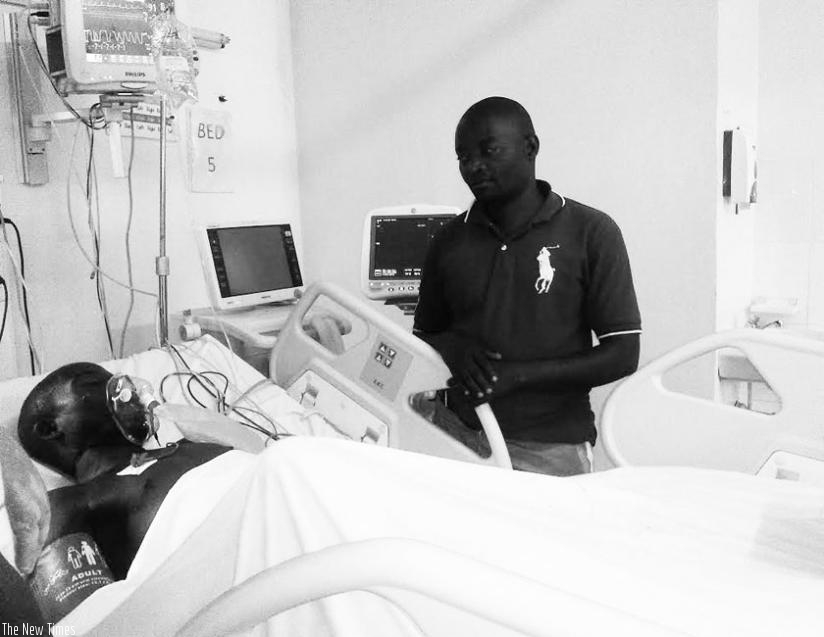Lying in bed with a respiratory machine hovering over his nose, Felicien Ntahondereye’s life seems to be in a dire state. He groans when he moves his limbs and he winces when he opens his mouth to speak.


Lying in bed with a respiratory machine hovering over his nose, Felicien Ntahondereye’s life seems to be in a dire state. He groans when he moves his limbs and he winces when he opens his mouth to speak. And yet his brother-in-law, Leonidas Nshuntiyabose who stands devotedly close to him is confident that the worst is behind them. Dr Jean Damascene Nyandui an anesthesiologist, reechoes Nshuntiyabose’s words. "He came to us when he was in a comma. But now he can breathe on his own, eat, speak (albeit strenuously)… he is well on his way to recovery.”
Into a ditch, into a coma
Ntahondereye’s story, of how he ended up in the Intensive Care Unit (ICU) of the University Teaching Hospital of Kigali (CHUK) is strange to say the least. Crossing the road on his way home on the night of 18th July, 2015, the 50-year-old farmer from Muganga village in Rusizi district was suddenly blinded by flash lights from an approaching vehicle, causing him to miss a step and he landed head first in a trench. This had an immediate severe damaging effect. By the time he was taken to Muganga Hospital, he was in a coma.
At Muganga Hospital, it was decided that he needed better medical care. He was then taken to Rubirizi District Hospital where for six days, he received healthcare without any improvement on his part, narrates Dr Nyandui.
"He was then transferred from Rubirizi to Butare Teaching Hospital and then from Butare CHUCK for better neurosurgical investigation and management.”
A brain CT scan done at CHUK hospital revealed an extradural haematoma, a collection of blood in the epidural space. Simply put, in human beings the epidural space is a foramen magnum, the point where the spine meets the base of the skull. It is vulnerable to developing epidural abscesses, infections that can impair neurological function. It is no wonder that when Ntahondeye was faced with this condition, most of his vital organs ceased to function and that he fell into a coma.
"He was brought to CHUK on 15th July. After a surgery was performed to rid him of the extradural haematoma, he recovered from the coma and started using respiratory support,” Dr Nyandui narrates.
Challenges and hopes
Dr Theobald Hategekimana attributes Ntahondeye’s almost-miraculous recovery to CHUK’s dedicated and well-trained staff. "People receive the required care as soon as they arrive. Our staff is well-trained to deal with medical emergencies and always carries out the required procedures in time.”
Dr Hategekimana is also quick to point out that the hospital is filled with good equipment such as CT scans and x-rays which go a long way in making it easy to handle emergency cases.
Ntahondeye’s doctors are confident that he will soon be transferred from the ICU to the High Dependency Unit or straight to the emergency ward or discharged if he shows signs of complete health. "All his vital signs are now normal and he’s responsive. He will achieve full recovery soon,” Dr Nyandui says.
However, the fact that the old farmer is a long way from home and that he cannot receive psychological support from his wife and six kids weighs on his brother-in-law’s mind. "We are also faced with financial constraint,” he adds. "But thankfully, through Community Health Insurance we are able to access treatment and drugs.”
How to handle accident victims
Ntahondeye is one of many people in Rwanda who have ended up in a critical state after motor-related accidents. Statistics released by Rwanda National Police in October last year indicate that 204 accidents were caused by motorists in August 2014, three-quarters of them occurring in Kigali. Accidents are therefore a common occurrence and they usually send by-standers into a state of panic, compelling them to act in a way they deem fastest to save the victim’s life.
Dr Hategekimana however, advises that you should be careful about how you react. "If you are not well-trained healthcare giver, avoid moving the victim. He/she might have a spinal fracture and you’ll risk increasing the damage.” He further advises that your first response should be calling 912-the emergency number. Also, avoid, at all costs, putting the victim in a small vehicle.
Asked what should be done in cases of excessive bleeding, Dr Hategekimana advises tying a piece of cloth around the bleeding area in order to compress. "But again, be very careful,” he emphasises. Rwanda has an organised health system, he says, and therefore access to emergency services or organising for transportation of patients is very easy.


